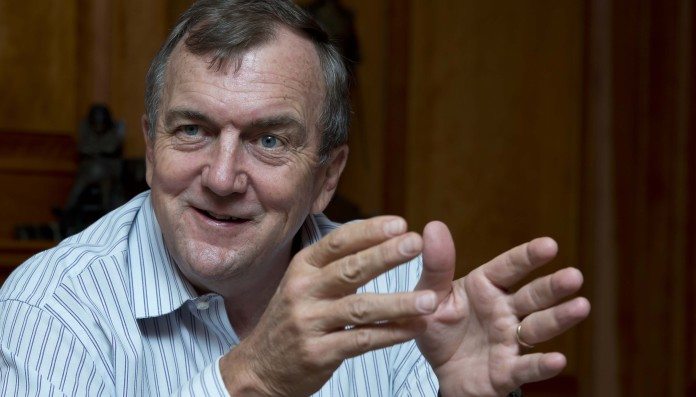
RANDGOLD Resources said it should “get close” to generating $500m in net cash by the close of its financial year – a level of liquidity which it has previously earmarked as the point when it would review its dividend policy.
Commenting in its third quarter operating and financial results, in which the firm righted second quarter operational collywobbles at its Kibali and Tongon mines, the company also said it would give definition to three new projects.
Two of them could collectively add between 500,000 to 600,000 ounces a year to production taking overall output in the medium-term to as much as 1.7 million oz.
“I have always said that a good gold company is one that is producing between one to 1.5 million oz sustainably,” said Mark Bristow, CEO of Randgold Resources.
“The market is starting to appreciate our strategy. We replace our gold organically, we don’t borrow money or issue equity and start to pay returns,” he said in an interview today.
Randgold reported a net profit of $77.3m, a 32% increase over the previous quarter which was blighted by milling problems at Tongo in Cote d’Ivoire, and a lack of mining flexibility at Kibali, the mine Randgold shares with AngloGold Ashanti in the Democratic Republic of Congo (DRC).
On a year-on-year basis, profit was 58% better which Bristow said was in part owing to the stronger gold price. However, production was also 7% higher at some 301,163 oz quarter-on-quarter which helped lower cash costs 9% to $663/oz. From a cash point of view, there was an 18% increase to $361.1m.
Asked how Randgold would allocate $500m in cash if it got there at the year-end, Bristow said: “We’ll keep it. Then we will revise the dividend policy.
“The current policy is progressive which we said we’d keep until we got to the half a billion dollar level, and then review. We will only pay one dividend a year, and in arrears,” he said. He declined to comment further on the potential payout as it would depend on cash flow and capital requirements.
The company has set itself the task of building three new mines which Bristow said would be “at least defined” in the next five years. One will be a replacement for Tongon which has between five and six years of mining life left.
The other two projects would be new or additional production. “What we are saying is that we should be able to deliver one new project out of west Africa and another from the north-eastern DRC in the next five years. I’m happy we’re back to that type of strategy. This will be new ounces,” he said.
Including 600,000 oz from Loulo, some 300,000 oz of attributable production from Kibali, and 300,000 oz from Tongon, Randgold has a current base of some 1.2 million ounces.
“Perfect targets for us are three million oz of mineable production which is about 250,000 to 300,000 oz a year,” said Bristow. If developed these projects would take Randgold output to 1.7 million oz at the upper end of aspirations.
TAX TROUBLES
Bristow described the recent closure of its regional office in Mali over a dispute related to value added tax returns as “a case of over-enthusiasm”.
“The disappointment is that we had a new, young minister who got over-enthusiastic and jumped on us really, publicly, ahead of procedure that gets followed,” he said. “The procedure is clear and we have the right to tribunal review.”
On October 7, the Mali government said it had shut down the offices of companies controlled by Randgold because there was some $80m in unpaid taxes – an allegation Randgold refuted.
“In the last three days, we have closed the offices of the company and seized their bank accounts,” Mohamed Lamine Samake told Reuters. “And if they don’t comply within 10 days, we are going to take our actions to the next level.”
Bristow said the company had agreed to a dispute mechanism which shouldn’t be viewed by the Mali government as a hostile step. “Some of the claims were warranted and we have paid them. But this is quite an enthusiastic attempt to get all the VAT returns back.
“We are not going to do that and we are not going to be threatened into a position. So we have agreed to a global settlement and have advanced $25m as part of that process with a very clear agreement that if there is any legal tax owing it will come from us and we will get it back,” he said.
The International Center for Settlement of Investment Disputes had recently awarded $29.2m plus costs to Loulo for taxes found by the tribunal to have been wrongfully collected by the Malian government.








